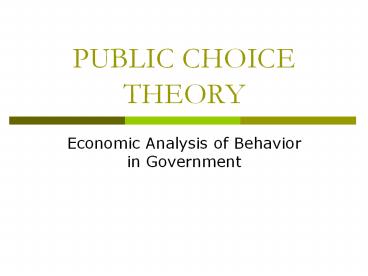PUBLIC CHOICE THEORY - PowerPoint PPT Presentation
1 / 12
Title:
PUBLIC CHOICE THEORY
Description:
... derived from the research of James Buchanan, Gray Becker, Victor Fuchs, Richard ... How do elected and appointed officials face scarcity? ... – PowerPoint PPT presentation
Number of Views:3633
Avg rating:3.0/5.0
Title: PUBLIC CHOICE THEORY
1
PUBLIC CHOICE THEORY
- Economic Analysis of Behavior in Government
2
Public Choice Theory
- Public choice theory is derived from the research
of James Buchanan, Gray Becker, Victor Fuchs,
Richard McKenzie, and Gordon Tullock. - It applies the analysis most often associated
with the study of private markets to behavior in
government.
3
Public Choice Theory Has Been Used to Study
- Prejudice
- Immigration
- Health
- Crime
- Spouse seeking
- Marriage
- Divorce
- Fertility
4
Public Choice 101
- Individual behavior in government is influenced
by many of the same considerations that influence
behavior in markets. - What incentives motivate government officials?
- How do elected and appointed officials face
scarcity? - How do elected and appointed officials face
competition? - How do elected officials make voluntary exchange
for mutual gain?
5
Incentives Matter
- Individual behavior in government is motivated by
incentives including - Monetary rewards
- Recognition
- Travel
- Information
- Influence
- Personal Satisfaction
6
Competition Elected Officials
- Candidates fact scarcity and competition. They
compete to - Win nominations
- Earn contributions
- Attract voters
- Find office space
- Gain support from colleagues
- Gain committee assignments
- Be re-elected
7
Competition Non-Elected Officials
- Non-elected officials face scarcity and
competition. They compete to - Increase budgets
- Obtain better equipment
- Earn travel funds
- Earn salary, promotions, and benefits
- Gain support from colleagues
- Influence decisions
- Maintain power
8
Exchange in Government
- Elected officials exchange
- Service to constituents
- Funding for state or district projects
- Support from interest groups
- In return for
- Nomination
- Votes
- Contributions
- Volunteers
- Re-election
9
Differences between Markets and Government
- Private markets depend on voluntary exchange.
- Private markets have a direct connection between
payment and consumption.
10
Difference between Markets and Government
- Government can set the rules of the game.
- Government can use coercion to enforce the rules
11
Interest Group Effects
- Interest groups are likely to be successful when
- Benefits are concentrated among a few.
- Costs are spread out over many.
12
Interest Group Effects
- Examples of interest group effects include
- Tariffs on steel
- Rent controls in some cities
- Sugar quotas
- Milk prices
- Farm Subsidies
- Ethanol Subsidies































